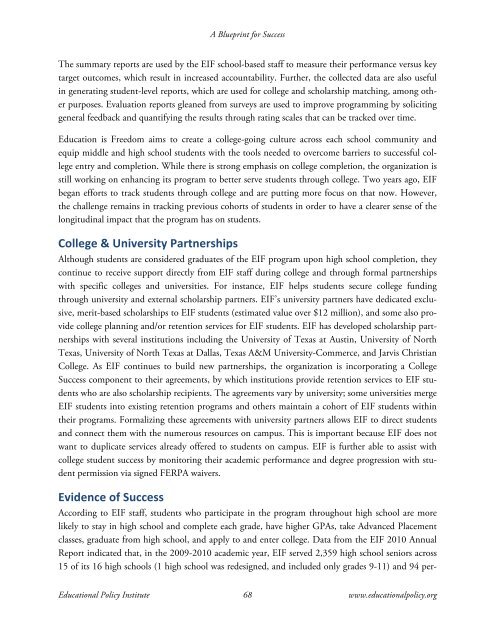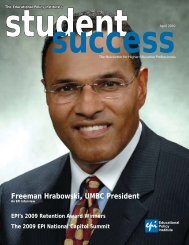A BluePrint for Success: Case Studies of Successful - Educational ...
A BluePrint for Success: Case Studies of Successful - Educational ...
A BluePrint for Success: Case Studies of Successful - Educational ...
You also want an ePaper? Increase the reach of your titles
YUMPU automatically turns print PDFs into web optimized ePapers that Google loves.
A Blueprint <strong>for</strong> <strong>Success</strong><br />
The summary reports are used by the EIF school-based staff to measure their per<strong>for</strong>mance versus key<br />
target outcomes, which result in increased accountability. Further, the collected data are also useful<br />
in generating student-level reports, which are used <strong>for</strong> college and scholarship matching, among other<br />
purposes. Evaluation reports gleaned from surveys are used to improve programming by soliciting<br />
general feedback and quantifying the results through rating scales that can be tracked over time.<br />
Education is Freedom aims to create a college-going culture across each school community and<br />
equip middle and high school students with the tools needed to overcome barriers to successful college<br />
entry and completion. While there is strong emphasis on college completion, the organization is<br />
still working on enhancing its program to better serve students through college. Two years ago, EIF<br />
began ef<strong>for</strong>ts to track students through college and are putting more focus on that now. However,<br />
the challenge remains in tracking previous cohorts <strong>of</strong> students in order to have a clearer sense <strong>of</strong> the<br />
longitudinal impact that the program has on students.<br />
College & University Partnerships<br />
Although students are considered graduates <strong>of</strong> the EIF program upon high school completion, they<br />
continue to receive support directly from EIF staff during college and through <strong>for</strong>mal partnerships<br />
with specific colleges and universities. For instance, EIF helps students secure college funding<br />
through university and external scholarship partners. EIF’s university partners have dedicated exclusive,<br />
merit-based scholarships to EIF students (estimated value over $12 million), and some also provide<br />
college planning and/or retention services <strong>for</strong> EIF students. EIF has developed scholarship partnerships<br />
with several institutions including the University <strong>of</strong> Texas at Austin, University <strong>of</strong> North<br />
Texas, University <strong>of</strong> North Texas at Dallas, Texas A&M University-Commerce, and Jarvis Christian<br />
College. As EIF continues to build new partnerships, the organization is incorporating a College<br />
<strong>Success</strong> component to their agreements, by which institutions provide retention services to EIF students<br />
who are also scholarship recipients. The agreements vary by university; some universities merge<br />
EIF students into existing retention programs and others maintain a cohort <strong>of</strong> EIF students within<br />
their programs. Formalizing these agreements with university partners allows EIF to direct students<br />
and connect them with the numerous resources on campus. This is important because EIF does not<br />
want to duplicate services already <strong>of</strong>fered to students on campus. EIF is further able to assist with<br />
college student success by monitoring their academic per<strong>for</strong>mance and degree progression with student<br />
permission via signed FERPA waivers.<br />
Evidence <strong>of</strong> <strong>Success</strong><br />
According to EIF staff, students who participate in the program throughout high school are more<br />
likely to stay in high school and complete each grade, have higher GPAs, take Advanced Placement<br />
classes, graduate from high school, and apply to and enter college. Data from the EIF 2010 Annual<br />
Report indicated that, in the 2009-2010 academic year, EIF served 2,359 high school seniors across<br />
15 <strong>of</strong> its 16 high schools (1 high school was redesigned, and included only grades 9-11) and 94 per-<br />
<strong>Educational</strong> Policy Institute 68 www.educationalpolicy.org




